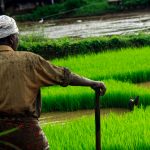Deepak Varshney, Anjani Kumar, Ashok k. Mishra, Shahidur Rashid, Pramod K. Joshi
Applied economic perspectives and policy
the April–June 2020 quarter, the nation’s agricultural sector, somewhat surprisingly, seems to have done remarkably well. This paper examines whether the public transfer program Pradhan Mantri Garib Kalyan Yojana (PMGKY), announced immediately after the lockdown, benefited farmers in dealing with the COVID shock. Overall, 95% of the smallholders received support from at least one of PMGKY’s four components. Direct cash transfers had significantly more impact than in‐kind transfer schemes. The result shows that farmers receiving cash transfers under PM‐KISAN, one component of PMGKY, were more likely to invest in buying seeds. In contrast, farmers receiving cash transfers under PM‐UY, another piece of PMGKY, were more likely to invest in fertilizer and pesticides. Finally, smallholders who received benefits from all four components of PMGKY were more likely to invest in purchasing seeds, fertilizer, and pesticides. Findings suggest the fungibility of public cash transfers from the recent PMGKY scheme is significant in alleviating credit constraints and increasing future investments in modern read more
Globally, there remain significant knowledge and evidence gaps around how to support Community Health Worker (CHW) programmes to achieve high coverage and quality of interventions.
COVID-19 induced lockdowns have had far reaching impacts on the rural sector, particularly on women farmers.
Public food transfer program provide a lifeline for the poor in both high- and low-income countries, and many countries stepped these up in response to COVID-19.


